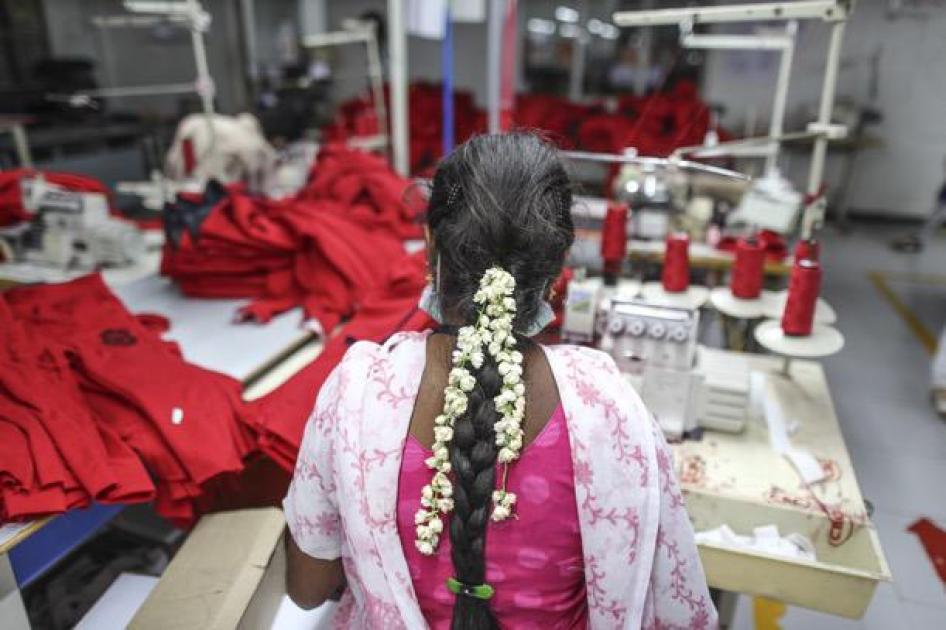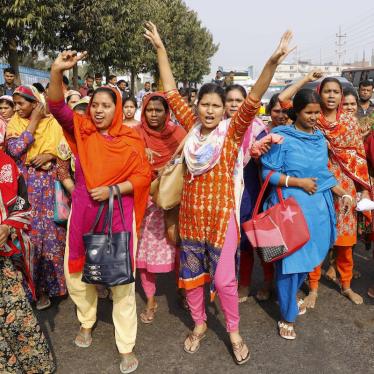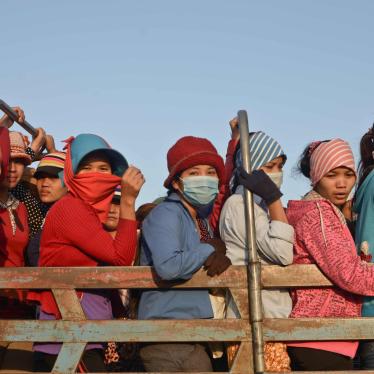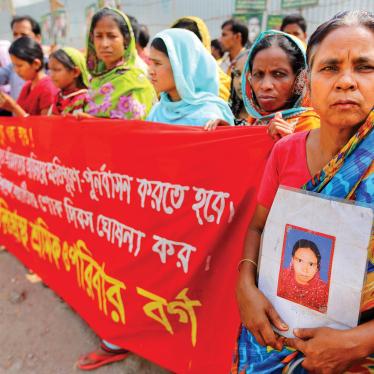No-one was within earshot, but Roja (not her real name), a garment worker, spoke in whispers as we walked in a park on a Sunday, her day off, in Mysore city in southern India. She described how her line supervisor constantly called her after work asking for sexual favors, promising lighter work or leave time. When she went to the factory management to complain, they sneered at her complaint, trivializing it as normal, and took no further action.
Roja is not alone. Human Rights Watch, International Labour Organization and others have reported sexual harassment in garment factories across a number of countries.
Many global apparel brands tout the steps they take to ensure garment workers in their supplier factories are treated well. Yet these measures, which rely heavily on social audits, tend to fall grossly short. At the same time, brands avoid steps that would truly empower workers to raise and address workplace abuses, like standing up for workers’ freedom of association.
Social audits are factory inspections, often carried out by third party auditors. These social audits, however, do not capture and address sexual harassment or other forms of gender-based violence at work. Such factory-based monitoring is not geared toward creating a safe environment for victims to report their experiences.
Human Rights Watch conducted a preliminary analysis of 50 third party audit reports of factories—most of them from Bangladesh, India, and Pakistan. Six large auditing firms issued the reports between 2016 and 2018. In each of the 50 reports, the auditors had interviewed workers in a combination of group and individual interviews, all on-site.
These audits are supposed to detect workplace abuses, including sexual harassment at work. But few workers were willing to speak out about a deeply stigmatized issue in front of others, or on the factory premises where managers know precisely who is speaking and can retaliate.
So it is not surprising that in these 50 reports, analysis of sexual harassment was either completely missing or at best cursory. Furthermore, none of the reports from India, Pakistan, or Bangladesh discussed how well the laws governing sexual harassment at work were being implemented. India and Pakistan have had laws since 2013 and 2010, respectively, and Bangladesh’s High Court Division of the Supreme Court issued guidelines against sexual harassment at work in 2009.
Only one report from India made a passing reference to the existence of a legally mandated “POSH [prevention of sexual harassment] committee” in the workplace. And even in that single report, it was unclear what training these committees received, how gender-sensitive they were, whether workers were protected against retaliation, or how the committees worked with unions.
Many brands and other industry groups also underestimate the importance of democratically elected worker committees or unions. In February, a European brand representative was telling me about her company’s “innovative” new program on gender in Bangladesh. This program had no connection with local unions and well-reputed nongovernmental organizations that work on women’s rights in Bangladesh.
When I encouraged her to integrate worker-driven solutions through democratically elected representatives into the program, I sensed her obvious impatience. She claimed that no-one, not even workers, liked unions. They were apparently a “headache”. A representative from another leading European brand acknowledged to me that brands did not focus much on monitoring workers’ freedom of association.
Yet, many global brands say they take seriously retaliation against workers who make complaints. In the apparel industry, workers’ freedom of association is central to ending retaliation. Factory workers find strength in numbers.
Union leaders are legally protected from unfair dismissals, enabling them to better help workers resolve problems in the factory. Moreover, workers and their representatives are in and out of the factories every day, and are among the most reliable routine monitors of workplace conditions.
Roja said she was poor but still had dignity. She hoped for brands to take stronger action to assist workers like her, and not to punish them further by taking their business and jobs elsewhere.
Brands serious about innovations and sustainable solutions beyond social audits should publicly report on the number of factories where workers are unionized, the number of collective bargaining agreements, and the business incentives they offer to factories that respect workers’ freedom of association.
They should encourage women’s participation in unions and design programmes with strong anti-retaliation components.
These are the steps that will help enable women workers not to silently endure and whisper about sexual harassment and other abuses but instead to speak out for their rights.









